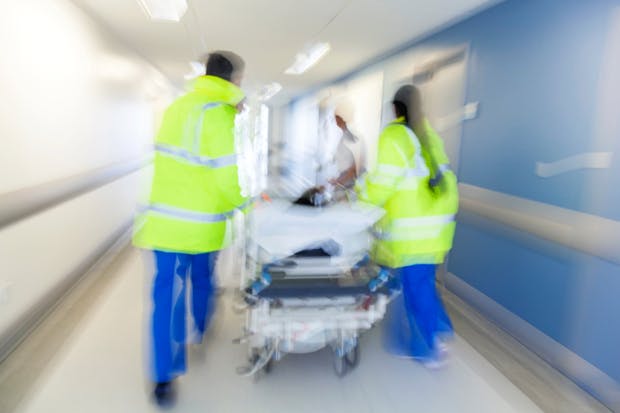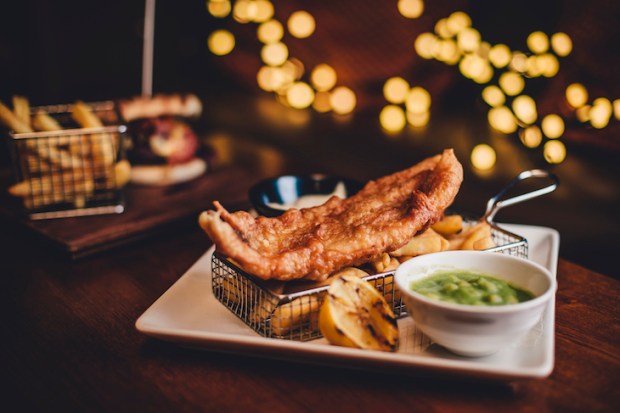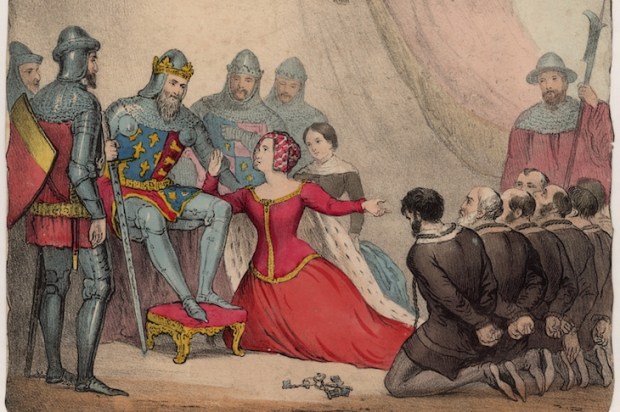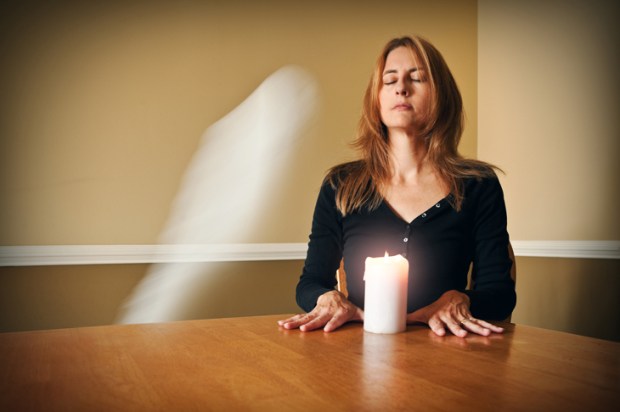The new year was two hours young. My boy and I were side by side on a row of three fixed plastic seats in the corridor of the accident and emergency ward. The both of us had come directly from our respective New Year’s Eve festivities, as had most, if not all, of the patients swaying, hobbling and staggering up and down the corridor or being wheeled in on trolleys by porters. Croc-shod nurses and nursing assistants weaved briskly and nimbly around and between these injured drunks, doggedly preserving their calmness, concentration and courtesy.
We faced the wide doorway to the row of curtained cubicles in which the urgent cases were being assessed by a single, exhausted doctor. A medley of deep, soulful groans issued from behind the purdah of wipe-clean curtains. Also female sobbing. A 50-year-old woman whose pasty, gelatinous thighs were restrained by tight elastic stocking tops and suspenders paused before my boy and said, ‘Do you want to see my puppy?’ A battered, unconscious face on a trolley pushed by a porter rolled smoothly by. Following closely behind were two hatless policemen wearing stab vests. The nearest copper bore a plastic bag containing the chap on the trolley’s ear. He handed it to the nurse standing beside the large computer screen at the nurses’ station. She held the bagged ear up to the light and said, ‘’Ere, ’ere!’ To which the copper replied, ‘Ear today, gone tomorrow!’ Inter-professional laughter. The bloody face on the trolley between them slept on. The elderly porter was a model of probity, awaiting further instructions with a poker face.
I turned to my boy and lovingly studied his mother’s dark features. I said, ‘You look really pissed.’ ‘And you’re not exactly sober,’ he said. I said, ‘You took a bit of a risk driving here, didn’t you? I’m glad you did, though.’ He said, ‘If you’d been stopped, by the look of you, they’d have locked you up and thrown away the key.’ Suddenly panic-stricken, I said, ‘Where’s my hat? Have you seen my hat?’ ‘It’s there, on your lap,’ said my boy, drily.
An emaciated man aged about 50 with cuts and contusions to his head and face (nothing much) aligned himself approximately with the plastic seat between us and collapsed backwards into it. From then on he sat perfectly still with his hands resting together in his lap and his chin resting on his collarbone. He looked like a man whose entire life has been one disaster after another. He was drunk, certainly. He couldn’t have been any drunker. But over and above that we sensed something fundamentally tragic about him. It was palpable. Whether caused by improvidence or poverty or poor diet or addiction or mental illness or rotten luck or sheer inability to comprehend this complicated, ever-changing world was of course impossible to say. Perhaps he was a Manchester United supporter, whispered my boy.
A nurse came out from behind the counter of her information station and said to this man, ‘What’s your surname, Alan?’ Alan mumbled at his hands that his name was Alan. ‘Alan what?’ said the nurse. But Alan couldn’t or wouldn’t say. ‘What’s your address, then, Alan?’ Again he couldn’t say. He had a vagrant air so perhaps he had no fixed abode. ‘If you give me an address, love, we’ll get a taxi to take you home.’ ‘Alan,’ mumbled Alan.
I asked my boy if he would like a coffee from the vending machine. He said he would. I asked Alan if he fancied one. No response. I went and came back with a cappuccino in each hand. ‘Taxi for Alan!’ I said, nudging his foot with mine. As I did so, one of the cardboard vending cups imploded, sending a surge of scalding coffee over the lower half of Alan, who didn’t react in any way. I ran for paper towels and as I dabbed the froth from his trousers, Alan spoke. He said, ‘Jubilee Gardens’. I nipped over to the information station and reported these precious words to the nurse.
Then my mum’s familiar face cruised past on a trolley pushed by a porter. It looked weary. She was progressing from the disorderly queue of trolleys next to the entrance, to the corridor next to the casualty bays. She pursed her ashen lips and lifted her eyebrows simultaneously at us. The porter parked her five yards away and departed. My boy and I went over. She was still bleeding, she said (she’d haemorrhaged at home at a quarter to twelve), but she thought that perhaps it wasn’t a lot like before. Mum was parked in the corridor for three hours before a vacancy occurred in one of the treatment bays. Under the circumstances we thought this wasn’t bad going.
Got something to add? Join the discussion and comment below.
Get 10 issues for just $10
Subscribe to The Spectator Australia today for the next 10 magazine issues, plus full online access, for just $10.















Comments
Don't miss out
Join the conversation with other Spectator Australia readers. Subscribe to leave a comment.
SUBSCRIBEAlready a subscriber? Log in